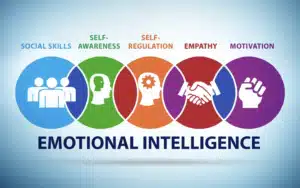Why Emotional Intelligence is the Cornerstone of Great Leadership
Introduction: The Missing Ingredient in Leadership
Many managers are promoted because they are technically excellent or have a long track record of results. Yet, countless organizations face the same problem: technically skilled managers who struggle to connect with, motivate, and retain their teams.
The missing ingredient? Emotional intelligence (EQ).
Technical knowledge might open the door to leadership, but EQ determines whether someone can step into the room and actually lead. Emotional intelligence is not soft—it’s strategic. It influences trust, engagement, decision-making, and culture, making it the true foundation of great leadership.
Defining Emotional Intelligence in Leadership
Emotional intelligence, as defined by psychologist Daniel Goleman, is the ability to recognize, understand, and manage both your own emotions and the emotions of others. In leadership, EQ is expressed through the way managers:
- Handle pressure and stress
- Deliver feedback
- Resolve conflict
- Inspire motivation
- Build trust and relationships
The five core components of EQ are:
- Self-Awareness – Recognizing your emotional states.
- Self-Regulation – Controlling impulses and staying calm under stress.
- Motivation – Staying focused on meaningful goals and inspiring others to do the same.
- Empathy – Understanding others’ perspectives and feelings.
- Social Skills – Building relationships and communicating effectively.
Why Emotional Intelligence is the Cornerstone of Great Leadership
1. Leaders with EQ Build Trust and Psychological Safety
Teams thrive when they feel safe to speak up without fear of judgment. A leader with emotional intelligence knows how to listen actively, respond with empathy, and foster an environment where mistakes are seen as learning opportunities. This psychological safety is directly linked to higher innovation and collaboration.
Example: At Google, research into high-performing teams found that psychological safety was the #1 factor behind success. Leaders who demonstrated empathy and EQ created environments where employees felt free to share ideas.
2. Emotional Intelligence Drives Employee Engagement
Engaged employees are more productive, more loyal, and more likely to go the extra mile. Managers with high EQ understand what motivates each individual on their team—not just money or recognition, but also purpose, growth, and belonging.
When employees feel understood and supported, they’re less likely to burn out or quit. Gallup research shows that 70% of employee engagement is influenced by managers. Leaders who lack EQ often see higher turnover, while those who demonstrate it retain top talent.
3. EQ Improves Decision-Making and Judgment
In leadership, decisions are rarely made in a vacuum. Stress, competing priorities, and team dynamics all influence outcomes. Leaders with EQ are better able to separate emotional reactions from logical reasoning. They don’t let frustration, fear, or ego drive decisions. Instead, they pause, reflect, and consider the broader impact.
This balance of head and heart is especially critical in high-stakes situations such as mergers, downsizing, or organizational change.
4. Emotional Intelligence Strengthens Conflict Resolution
Conflict is unavoidable in business. The difference between a toxic culture and a thriving one often comes down to how leaders handle it. Leaders with high EQ don’t shy away from conflict; they lean in with empathy and fairness.
They seek to understand underlying concerns, validate emotions, and guide the team toward constructive solutions. This ability not only resolves issues but also strengthens relationships in the long run.
5. EQ Shapes Organizational Culture
Culture starts at the top. Leaders set the tone for communication, collaboration, and values. A leader with high EQ models patience, respect, and empathy—and the team follows suit. Conversely, leaders with low EQ create cultures of fear, disengagement, and high turnover.
Simply put: leaders’ emotional intelligence becomes the culture’s emotional intelligence.
Real-World Examples of EQ in Action
- Satya Nadella (Microsoft CEO): Nadella transformed Microsoft’s culture by emphasizing empathy, collaboration, and growth mindset. Under his leadership, Microsoft regained its position as one of the most valuable companies in the world.
- Howard Schultz (Starbucks): Schultz often spoke about leading with compassion, from healthcare for part-time employees to tuition assistance. His EQ-driven leadership fueled Starbucks’ global growth and loyal workforce.
- Jacinda Ardern (former New Zealand Prime Minister): Ardern’s empathetic communication style during crises, including the Christchurch shootings and COVID-19, earned global respect and trust.
How Managers Can Develop Emotional Intelligence
While some people naturally exhibit higher EQ, it’s not a fixed trait. Managers can actively develop it through intentional practice:
1. Seek Feedback and Reflect
Tools like 360-degree feedback assessments give leaders an honest view of how their behavior impacts others. Self-awareness begins with understanding how others perceive you.
2. Practice Mindfulness and Emotional Regulation
Techniques like deep breathing, journaling, or pausing before responding in conflict situations help leaders stay calm and avoid reactive decisions.
3. Strengthen Empathy
Start small: ask team members how they’re doing—and really listen. Show genuine curiosity about their experiences and challenges.
4. Improve Communication Skills
Great leaders adjust their style depending on the audience. That means being clear and direct in one situation and listening deeply in another.
5. Invest in Coaching and Training
Leadership development programs that focus on EQ can accelerate growth. External coaches can also provide accountability and tailored strategies for improvement.
Emotional Intelligence and the Future of Leadership
The workplace is changing:
- Remote and hybrid work require stronger relationship-building skills.
- Diverse teams demand inclusive leadership and empathy.
- AI and automation increase the need for uniquely human skills—like emotional intelligence.
The World Economic Forum predicts that emotional intelligence will be one of the top 10 skills for the future of work. For organizations, developing EQ in leaders isn’t optional—it’s a business imperative.
Conclusion: Great Leadership Starts with EQ
Leaders who master emotional intelligence don’t just manage tasks—they inspire people. EQ empowers managers to build trust, motivate teams, resolve conflicts, and shape culture in ways that drive long-term success.
In today’s workplace, where adaptability and empathy are critical, emotional intelligence is more than a nice-to-have. It is, truly, the cornerstone of great leadership.
Ready to help your managers grow as emotionally intelligent leaders?
👉 Discover how 360-degree feedback assessments from G360 Surveys can identify strengths, uncover blind spots, and accelerate leadership development.


